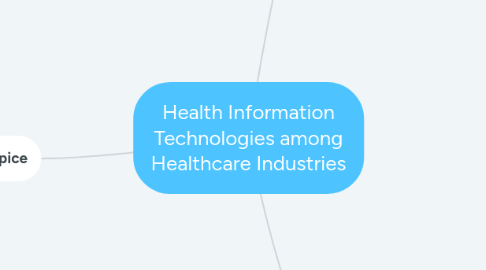
1. Home Health/Hospice
1.1. Axxess
1.1.1. Convenience with onsite mobile app access
1.1.2. Verify visits at the point of care and ensure compliance
1.1.3. Management of tasks in clinical, administrative, financial, scheduling, billing, human resources, etc.
1.1.4. Accept referrals and connect with referring organizations
1.1.5. Complaints of clients waiting for services to be billed correctly and timely.
1.2. Axis Care
1.2.1. GPS mobile app
1.2.2. Automatic invoicing, billing and payroll; custom forms and reports
1.2.3. Telephony tool- Caregivers can check in and out from a client's home via cell phone or the client's home phone
1.2.4. Increased communication between the office and the caregiver through notification tools
1.2.5. Multiple issues with app updates and loss of functionality
1.3. Clear Care
1.3.1. Proprietary scheduling, telephoning tools, HR and financials, applicant management, sales management, and CRM
1.3.2. Focussed on eliminating back office tasks, paper care journals, wasteful billing practices, and ineffective communication with staff, patients, and families
1.3.3. Designed to communicate with frontline staff
1.3.4. Inability to review cell phone text updates through the computer adds inconvenience.
2. Hospitals
2.1. Meditech
2.1.1. 16.6% of market share
2.1.2. Founded in 1969
2.1.3. high marks for meaningful use of products
2.1.4. committed to environmental friendliness
2.1.5. strong supporter of nonprofit organizations
2.2. Cerner
2.2.1. 24.6% of market share
2.2.2. high marks in user independent user satisfaction surveys
2.2.3. utilizes behavioral health, workforce management, population health, and patient engagement technology
2.2.4. has faced a few lawsuits regarding EHR functionality
2.3. Epic Systems
2.3.1. 25.8% of market share
2.3.2. well established product (first software built in 1979)
2.3.3. 51% of Americans have an Epic record.
2.3.4. EHR systems are the most expensive on the market
2.3.5. very focused on data exchange between hospitals, physicians, payers, clinics, and other stakeholders
3. Long Term Care
3.1. Vision
3.1.1. Founded in 1999
3.1.2. Convenient documenting of the patient health assessment process, generating care plan activities based on individual needs.
3.1.3. Patient records integrated with system financial features
3.1.4. Focus on improving CMS reimbursement
3.1.5. Strong referral management features
3.2. ECP EHR
3.2.1. Operating since 2004
3.2.2. Strong staff alert and reminder capabilities for ensuring patient regimens.
3.2.3. Great administrative management tools for tracking medication inventory.
3.2.4. Integrates with most major pharmacy software vendors, with automated reordering process.
3.2.5. Generates care plans with ease, provides electronic charting, and assists with state mandated reports.
3.3. PointClickCare
3.3.1. Founded in 1995
3.3.2. Focus on helping users achieve regulatory compliance, improve reimbursement, and reduce duplicate entry.
3.3.3. Supports mobile device integration
3.3.4. Streamlining workflow and improving patient care.
3.3.5. Medication and nutrition management features
3.3.6. HIPAA compliant text messaging feature
